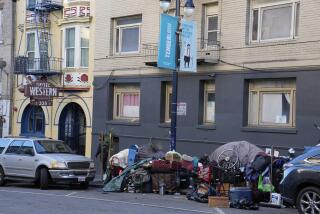A Mission Never Accomplished
- Share via
There’s nothing fancy about Chamalene Johnson’s dining room. There’s a stretch of freeway overhead, a dirt patch underneath and a few wind-whipped dust clouds.
But then it’s really the food that matters.
Every Tuesday for the past year, Johnson, 53, and her family have used this spot under the freeway overpass at the end of Olive Street in downtown Ventura to serve hot meals to the homeless.
On a recent afternoon, Johnson, her son Jed and a family friend went to work setting up a table. Several people who had been awaiting their arrival quickly shuffled into line, allowing two children and their mother to get in front.
“Here comes the grub!” one man called out.
The meal that day included chicken, mashed potatoes and vegetables, with juice and bottled water.
“She serves really good food, and it’s homemade,” said Justine Wright, 36, who has been living in her SUV for the last several weeks with her daughter, Hillery, 10, and son Conrad, 8. “We always look forward to getting something nourishing.”
Johnson does more than just feed the homeless of Ventura, whom she calls her “children.” She also helps them do their laundry once a month and is always on call to transport them to and from the hospital, detox center, court or anywhere else they might need to go.
“What she does is really a blessing. Sometimes she brings clothes and blankets to us,” said James Fields, 47, hunched over a plate of chicken.
Johnson’s family has been feeding and assisting the homeless in Ventura for six years.
“Some call me Mom,” said Johnson, an ordained minister. “They are my extended family. If they never had a mom, I want them to feel that they have one now. Or if they did, I want them to remember what it was like.”
Though the people she helps praise Chamalene’s efforts, not everyone shares her enthusiasm.
On a recent Tuesday, police officers arrived at the meal site on two separate occasions, saying that they had received complaints about a large gathering of homeless people who were drinking and urinating in public.
Johnson said she’s been forced to move four times in six years, and expects it to happen again. She’s been working with Sharon Troll, a member of the Westside Community Council, to find a new location.
“You’ll probably find differences of opinion even among people who work in social services,” Troll said of Johnson’s work. “I personally don’t think people should be eating out on the streets.”
While plans are in the works to build a permanent, year-round shelter and service center for the city’s homeless, it could be years before it becomes a reality. No one is certain exactly how many people are living on Ventura’s streets.
In the meantime, Johnson remains committed to her mission.
Before moving to Ventura County in 1996, she and her husband, Dick, and their children lived in a 3,600-square-foot home on an acre in Wrightwood. Johnson was happy.
But Dick, who helps run an automotive supply business in Ventura, wanted a change. “I’d had enough of spending my life working for something I couldn’t afford. I wanted to live simpler,” he said. That meant trading in the big house for a motor home and moving to Ventura.
At first, Chamalene resisted the idea. But after praying about it, she agreed. It was also at this time, she said, that she felt a special calling to help the homeless.
It wasn’t easy. One encounter with a transient scared Johnson so badly that she ran from the person. So she tried a different tack.
She prepared sack lunches, attached a note with some encouraging words and left them on park benches downtown.
It wasn’t long before she made friends with the people she wanted to help. Eventually, she began serving meals to the homeless in the parks.
At first, she served food three times a week, but expenses forced her to scale back to one meal. She prepares enough for about 50 people. Johnson and her husband estimate that they spend about $100 to $150 on food each week.
Most of the money for the meals program comes directly out of their own pockets.
“The money that we’d use for house payments or whatever, we can use for feeding and taking care of people,” said Dick Johnson, who lives with his wife at an RV park in Santa Paula.
Despite the expense and the work, Chamalene said she will continue to feed the homeless.
“I don’t think that I’m going to be able to save them,” she said, “but I’m here to love them just the way they are.”
More to Read
Sign up for Essential California
The most important California stories and recommendations in your inbox every morning.
You may occasionally receive promotional content from the Los Angeles Times.










